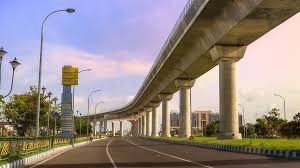In recent years, India has witnessed a remarkable transformation in its infrastructure development, largely driven by technological advancements. From smart cities to modern transportation systems and sustainable energy solutions, technology has played a pivotal role in reshaping the nation's infrastructure landscape. This article delves into some of the key technological innovations that are driving India's infrastructure revolution and their potential implications for the country's future.
Smart Cities: Building the Future
One of the most significant trends in India's infrastructure development is the rise of smart cities. Leveraging cutting-edge technologies such as the Internet of Things (IoT), artificial intelligence (AI), and data analytics, smart cities are designed to improve the quality of life for residents while enhancing overall urban efficiency. These cities integrate various aspects, including smart energy grids, intelligent transportation systems, waste management solutions, and efficient water supply networks. As a result, they offer a glimpse into a more sustainable and digitally connected future for India.
Transportation Transformation: From Hyperloops to EVs
India's transportation sector has seen a massive technological overhaul. Ambitious projects such as the hyperloop, a high-speed transport system, hold the promise of revolutionizing intra-city travel, significantly reducing travel time between cities. Additionally, the nation's shift towards electric mobility is gaining momentum, with an increasing number of electric vehicles (EVs) hitting the streets. This transition not only reduces greenhouse gas emissions but also improves air quality, addressing a pressing concern in major urban centers.
Infrastructure Digitization: The Power of Data
Data-driven decision-making has become a driving force behind infrastructure development in India. Advanced data analytics, machine learning, and predictive modeling enable policymakers and urban planners to make informed choices regarding infrastructure projects. By analyzing vast amounts of data, they can optimize resource allocation, identify potential problem areas, and design more efficient systems that cater to the needs of the population.
Renewable Energy Revolution: Solar and Beyond
In the pursuit of sustainable development, India is leveraging its immense solar potential. With advancements in solar technology and favorable government policies, the country is rapidly expanding its solar energy capacity. Furthermore, India is exploring other renewable energy sources like wind and hydroelectric power, reducing its dependence on fossil fuels and moving towards a cleaner, greener future.
5G Connectivity and IoT Integration
The rollout of 5G technology in India promises to revolutionize the way infrastructure operates. With faster and more reliable connectivity, 5G enables seamless communication between devices and infrastructure elements, enabling the efficient management of transportation, utilities, and public services. Combined with the Internet of Things (IoT), 5G paves the way for a more interconnected and intelligent infrastructure ecosystem.
Conclusion:
Technological advancements have ushered in a new era of infrastructure development in India, characterized by sustainability, efficiency, and connectivity. The ongoing efforts to build smart cities, embrace electric mobility, harness renewable energy, and embrace data-driven solutions are reshaping the nation's infrastructure landscape. As India continues to embrace innovation, these technological advancements hold the potential to accelerate economic growth, enhance quality of life, and create a more resilient and sustainable future for all its citizens.





Comments